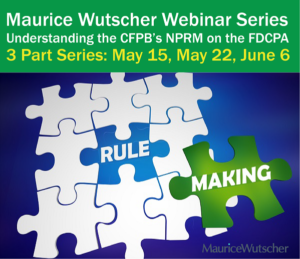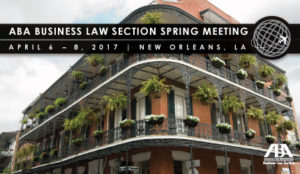 Oct. 21, 2016 — Maurice Wutscher attorneys Donald Maurice, Eric Rosenkoetter, Keith Wier and Brent Yarborough have written articles for Business Law Today’s mini-theme Debt Collection and Bankruptcy in its October issue.
Oct. 21, 2016 — Maurice Wutscher attorneys Donald Maurice, Eric Rosenkoetter, Keith Wier and Brent Yarborough have written articles for Business Law Today’s mini-theme Debt Collection and Bankruptcy in its October issue.
Mr. Maurice, who is chair of the Bankruptcy and Debt Collection Subcommittee of the Consumer Financial Services Committee, introduces the mini-theme and gives historical context of the federal Fair Debt Collection Practices Act and the changing face of the debt collection industry.
“When originally enacted, the FDCPA did not provide any agency with rulemaking authority. As a result, the statute has gone largely unaltered. But the debt collection industry has dramatically changed with the emergence of debt buying entities and large-scale securitization of consumer debt. New technologies such as paperless transactions, the ubiquitous use of cell phones, text messaging, and even voice mail hardly mesh with the 1970’s-era FDCPA,” Mr. Maurice writes.
With Dodd-Frank giving the CFPB the authority to promulgate rules under the FDCPA, this summer the CFPB released an outline of proposals subject to the FDCPA.
In The CFPB’s Outline of Debt Collection Proposals: A Look Into the Past and Future, Mr. Rosenkoetter and Mr. Wier provide a summary and analysis of the CFPB’s outline. Their article examines past events leading to the outline and the effect the proposals may have on debt collectors, debt buyers, and creditors.
“Fortunately, most estimates place implementation of the final rule in 2019, which provides ample time to consider what it would take to comply with rules similar to those in the Outline. Although it might be premature to implement changes based on mere proposals, time remains to develop implementation strategy, prioritization, and anticipated cost so that when the time comes, a plan is in place for quick implementation and testing of any new technologies, policies, and procedures,” write Rosenkoetter and Wier.
In Do You Think Banks Are Debt Collectors? The CFPB and the FTC Do, Mr. Yarborough, along with Jolina Cuaresma and Katherine Lamberth, discuss the CFPB’s debt collection rulemaking process. The CFPB’s outline of proposals is aimed solely at “debt collectors” subject to the FDCPA. However, due to a growing circuit split over the scope of the definition of “debt collector” for purposes of the FDCPA, it is unclear whether banks and other creditors that collect on debts acquired in default fall within the ambit of the CFPB’s proposals, they write.
Finally, Mr. Maurice looks at the intersection of the FDCPA and bankruptcy law, particularly when debt collectors file proofs of claim for consumer debts subject to expired statutes of limitations in The Growing Circuit Split on Proofs of Claim for Time-Barred Debt.Whether the filing of a proof of claim for a debt subject to an expired limitations period violates the FDCPA has divided four Circuit Courts of Appeals in the course of two years.
“The Fourth (Dubois v. Atlas Acquisitions, LLC), Seventh (Owens v. LVNV Funding LLC), and Eighth (Nelson v. Midland Credit Management Inc) Circuit Courts of Appeals all agreed that time-barred debts that can be lawfully collected under state law are claims, and a creditor’s mere filing of a proof of claim subject to an expired limitations period is not false, deceptive, or misleading. These decisions also point to the existing protections bankruptcy courts provide debtors under both the Bankruptcy Code and Rules, and to the desire to bring all claims that can be asserted against debtors within the bankruptcy process,” Mr. Maurice writes.
The issue is now before the U.S. Supreme Court. The article examines the controversy and its implications for creditors and debtors under the bankruptcy code.
Business Law Today is published by the American Bar Association’s Business Law Section.
 Sept. 12, 2019 — Maurice Wutscher will host a webinar on Sept. 19, Emails and Hyperlink Delivery of FDCPA Disclosures after Lavallee, exploring the landscape for the use of electronic communications in debt collection.
Sept. 12, 2019 — Maurice Wutscher will host a webinar on Sept. 19, Emails and Hyperlink Delivery of FDCPA Disclosures after Lavallee, exploring the landscape for the use of electronic communications in debt collection.



